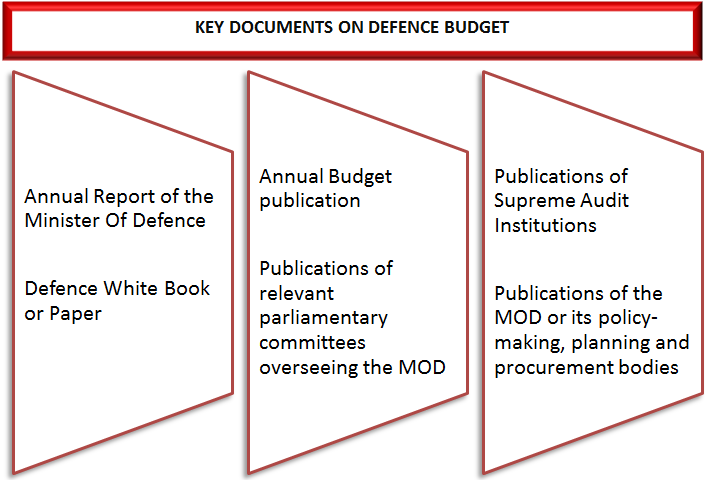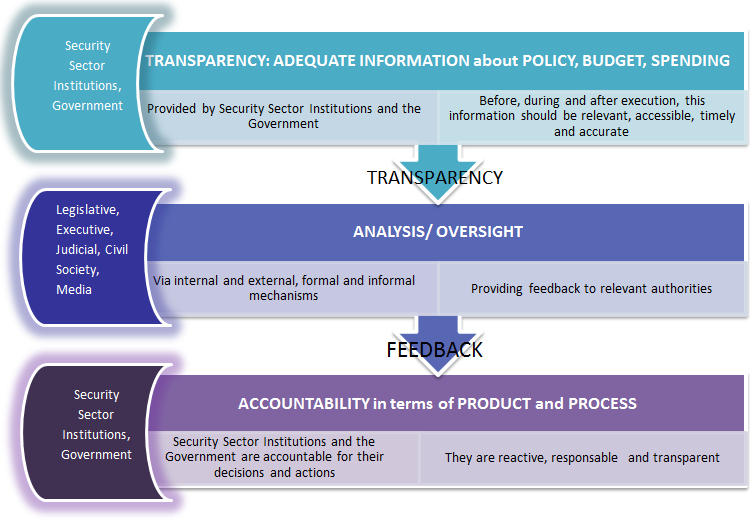“Transparency is a characteristic of governments, companies, organisations, and individuals that are open in the clear disclosure of information, rules, plans, processes, and actions”
Transparency International
What is Transparency?
According to Transparency and Accountability Initiative, public officials, civil servants, managers and directors of companies and organisations and board trustees have a duty to act visibly, predictably and understandably to promote participation and accountability.[1] Security Sector institutions provide security as a public good. Transparency and accountability of the security providers, both in terms of product/service and process, are of vital importance here since they directly impact the quality of that public good. Therefore, relevant information about policy and resources should be made publicly available.[2] This can take the form of Annual Reports of the Ministry of Defence (MOD), White Papers on Defence and Security, Annual budget publications, etc., (see “Key Documents on Defence Budget” graphic). The publication of such papers and other relevant information is imperative for transparency and accountability. Unfortunately, the list of official, publicly available documents which contribute to transparency produced by the security sector institutions remains quite short.
Why is it important?
Transparency, along with accountability, allows fewer opportunities for corruption.[3] Tilcho Ivanov, points out that transparency is the main precondition for civil control, accountability, and good governance of the security sector. There must be relevant openness, clarity, and credibility when it comes to security and defence policies. Key documents and other information prepared, or commissioned by the government, including Ministry of Defence and security agencies, should be made available to the public.[4] However, transparency is not the only criteria for good governance. Transparency depends on other good governance principles, such as consensus, participation, predictability, strategic planning, responsiveness, effectiveness, efficiency accountability, equity, rule of law, building integrity, oversight, and audit. These principles are mutually-dependent and, in the final sense, they indicate the development of modern civil society in a country.[5]
How does it work?
Transparency and Accountability Initiative warns that making information available is not enough to achieve transparency. Information should be managed and published so that it is:
- Relevant and accessible: presented in a clear and comprehensible manner with enough detail and disaggregation for analysis, evaluation, and participation. Information should be adapted to different audiences.
- Timely and accurate: provided with sufficient time to allow analysis, evaluation, and engagement by relevant stakeholders. That means that it should be made available while planning, as well as during and after the implementation of policies and programmes. Information should be up-to-date, accurate, and complete.[6]
Additionally, Shamsul Haque identifies two types of mechanisms that contribute to transparency and accountability:
External Mechanisms:
- External-formal Mechanisms:
- Legislative Instruments (legislative committees, parliamentary committees)
- Executive means (controls exercised by authorities over public agencies)
- Judicial processes (administrative courts and ombudsmen)
- External-informal Means:
- Public hearings, opinion polls, interest groups and the media.
Internal Mechanisms:
- Internal-formal Mechanisms (hierarchies, official rules, codes of conduct, performance reviews).
- Internal-informal Means (organisational culture, professional ethics, and peer pressure).[7]
It is essential to insist on the need for making the process of planning, programming, budgeting, and executing transparent so that civil society has adequate information about the decisions made by security sector institutions. With that information at hand, ministers, parliamentarians, Civil Society Organisations (CSOs), and other concerned actors can duly exercise their right of holding the security and defence establishments accountable for the performance of their duties as providers of public security. This is crucial to ensure that security sector funds are being spent effectively and efficiently.
Additionally, policy/budget execution assessments, programme monitoring and evaluation schemes are necessary in order to ensure that transparency translates into accountability.
Who is involved?
According to Tilcho Ivanov, the armed forces and security agencies must be answerable to ministers who are, in turn, answerable to elected representatives of the people. These representatives should exercise legislative oversight of security sector institutions, policy and spending. Latter and their performance should also be monitored by CSO’s, NGO’s, academics, media, interest groups and civil society at large.[8]
Resources
Bonn International Center for Conversion (BICC) (2002), Voice and accountability in the security sector. Paper 21.
Born Hans, Wills Aidan, DCAF-Ministry of Foreign Affairs of the Netherlands (2012), Overseeing Intelligence Services: a Toolkit.
Centre for Integrity in the Defence Sector (2015) Criteria for good governance in the defence sector. International standards and principles (2015)
Centre for Integrity in the Defence Sector. Integrity Action Plan. A handbook for practitioners in defence establishments (2014).
Centre for Integrity in the Defence Sector: Guides to Good Governance
DCAF (2015) International Standards of Financial Oversight in the Security Sector. 7.2 Toolkit- Legislating for the Security Sector.
DCAF (2008), National Security Policy Backgrounder. New edition available here.
DCAF (2009), Defence Reform. Backgrounder. New edition available here.
DCAF (2009), Police Reform. Backgrounder. New edition available here.
DCAF (2009), Security Sector Governance and Reform Backgrounder. New edition available here.
DCAF (2009), Security Sector Reform and Intergovernmental Organisations. Backgrounder. New edition available here.
DCAF (2006) Parliament’s role in Defence Procurement. DCAF Backgrounder. New edition available here.
DCAF (2006) Parliament’s role in Defence Budgeting. DCAF Backgrounder. New edition available here.
DCAF (2006) Parliamentary Oversight of Intelligence Services. DCAF Backgrounder. New edition available here.
DCAF (2006) Parliamentary Committees on Defence and Security. DCAF Backgrounder. New edition available here.
DCAF (2015), Parliamentary Brief: Building Integrity in Defence.
DCAF – UNDP (2008) Public Oversight of the Security Sector. A Handbook for Civil Society Organizations.
DCAF (2009), Defence Management: an Introduction. Security and Defence Management Series No. 1.
Ivanov Tilcho, «Transparency of Defence Policy in Progress», Information and Security. An International Journal. Vol. 11, 2003. pp 55-72.
Nicolas Masson, Lena Andersson, Mohammed Slah Aldin, DCAF (2013) Strengthening Financial Oversight in the Security Sector.
NATO-DCAF, (2010). Building Integrity and Reducing Corruption in Defence. A Compendium of Best Practices.
NATO (2012) Building Integrity Programme
OECD (2002) Best Practices for Budget Transparency
OSCE Code of Conduct on Politico- Military Aspects of Security
Transparency International (2013) Watchdogs? The quality of legislative oversight of defence in 82 countries. Government Defence and-corruption index.
Transparency and Accountability Initiative.
Transparency International. International Defence and Security Programme.
The World Bank (1988), Public Expenditure Management Handbook.
Transparency International (2012). Building Integrity and Countering Corruption In Defence and Security. 20 Practical Reforms.
Transparency and Accountability Initiative.
Transparency International. International Defence and Security Programme.
United Nations SSR task force, Security Sector Reform Integrated Technical Guidance Notes. 2012.
UN Instrument for Standardized International Reporting of Military Expenditures.
[1] Transparency and Accountability Initiative.
[2] Ivanov Tilcho, «Transparency of Defence Policy in Progress», Information and Security. An International Journal. Vol. 11, 2003. pp 55-72.
[3] «The Importance of Integrity Building» in Building Integrity and Reducing Corruption In Defence: a Compendium of Best Practices. p165.
[4] Ivanov Tilcho, «Transparency of Defence Policy …p 57
[5] Ibid., p 56.
[6] Transparency and Accountability Initiative.
[7] M. Shamsul Haque, “Significance of Accountability under the New Approach to Public Governance” International Review of Administrative Sciences 66, no 4. (December 2000): 599-618. In Ivanov Tilcho, «Transparency of Defence Policy …p 59.
[8] Ivanov Tilcho, «Transparency of Defence Policy …p 58.





